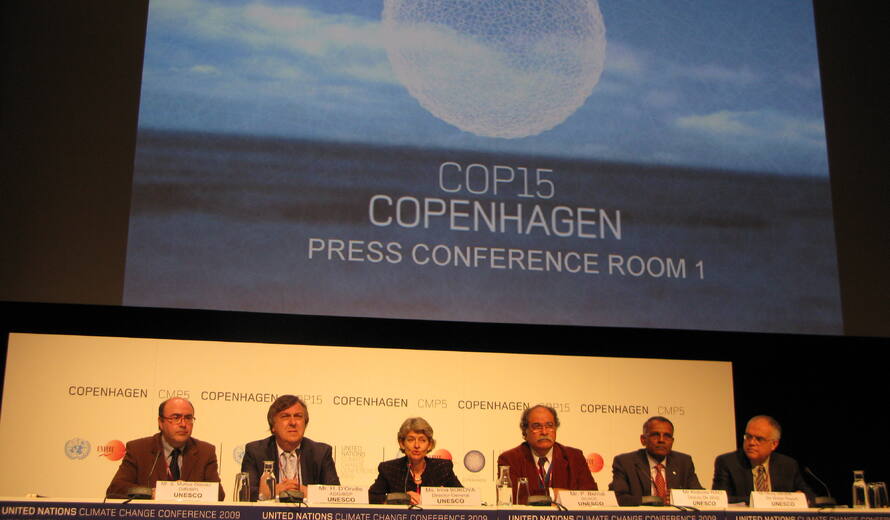Director General presents UNESCO climate change initiative at Copenhagen Conference
Irina Bokova, Director-General of UNESCO, yesterday presented UNESCO's climate change initiative at a press briefing held during the 15th Conference of the Parties (COP 15) of the United Nations Framework Convention on Climate Change (UNFCCC).
"Thanks to its interdisciplinary capacities, UNESCO can render a unique contribution to mitigation and adaptation to climate change through distinct action in education, the sciences, culture, communication and information. All these efforts are closely coordinated with the response of the entire UN system to the new global challenge. In particular, and most prominently as a first pillar of its initiative, UNESCO continues to contribute to climate science and the building of the indispensable knowledge base through its Intergovernmental Oceanographic Commission (IOC), in close collaboration with the World Meteorological Organization (WMO) and its International Hydrological Programme (IHP)". This work contributes to the better understanding and forecasting of climate phenomena.
The second pillar of the UNESCO initiative pertains to climate change education, which is being promoted in the context of the UN Decade on Education for Sustainable Development. UNESCO was assigned the lead role for the Decade by the UN General Assembly. Action in this area comprises assistance to Member States with regard to curricula revision, teacher training and education strategies at all levels, including TVET [Technical and Vocational Education and Training]."
The third pillar consists of cultural and biological diversity, as well as cultural heritage. As Ms Bokova stated at the briefing, "UNESCO will assist Member States to harness the iconic values of World Heritage sites and Biosphere Reserves to showcase adaptation and conservation measures". UNESCO is also expected to link its activities to the Reduction of Emissions from Deforestation and Forest Degradation in Developing Countries (REDD) mechanism expected to be one important outcome of the Copenhagen Conference.
Lastly, UNESCO will deal with various ethical and social dimensions of climate change, including through the launch of a consultative process aimed at judging the advisability of preparing a declaration of ethical principles in relation to climate change, as decided by the Organization's General Conference last October. Furthermore, UNESCO will examine the social dimensions of climate change, including migration issues.
The Director-General, who arrived in Copenhagen on 15 December and will stay until the afternoon of 17 December 2009, has attended the high-level plenary meetings of COP 15 and participated fully in two formal activities of the Executive Heads of the UN system, chaired by the UN Secretary-General, Ban Ki-moon. One event was a closed briefing, by the Secretary-General and for the leaders of the UN system, on the status and prospects for the negotiations at the Copenhagen Conference. Ban Ki-moon introduced the Director-General to her new colleagues on that occasion.
The other event was a town hall-style meeting with members of the Chief Executives Board (CEB), on to the theme "The UN system delivering as one on the issue of climate change". The Director-General was invited to speak on this occasion, in response to questions asked about UNESCO's contribution. These two events provided her with the opportunity to exchange views on areas of future collaboration with many of her colleagues in the CEB, as well as to explore possibilities for future joint efforts in the context of UN reform.
The Director-General also had the opportunity to meet with Heads of State and Government, as well as with senior Ministers, in a series of informal meetings. As such she had discussions with Jean Ping, President of the African Union Commission, and Jean Charest, Prime Minister of Quebec. Among the leaders she was able to meet were Presidents Amadou Toumani Toure (Mali), Abdoulaye Wade (Senegal), Mohamed Nasheed (Maldives) Tarja Halonen (Finland), Gjorge Ivanov (Former Yugoslav Republic of Macedonia), Emomali Rahmon (Tajikistan) and Prime Ministers Nguyen Tan Dung (Viet Nam), Stephenson King (Saint Lucia) and Ojo Maduekwe, Foreign Minister of Nigeria.
Moreover, the Director-General attended a dinner hosted by the Secretary-General of the Danish National Commission and the Lord Chamberlain of the Danish Royal Court, which was equally attended by the Danish Minister of Education, the Chairperson of the Danish National Commission and other Danish dignitaries.
In the course of her last day in Copenhagen, on 17 December, she will again attend the high-level plenary meetings of COP 15 and has scheduled another series of meetings with participating leaders, including with the Brazilian Minister of Foreign Affairs. A working meeting with the Danish Minister of Education is also foreseen. Prior to her departure, she will be one of the guests at a luncheon hosted by the Executive Secretary of the UNFCCC, Yvo de Boer.
